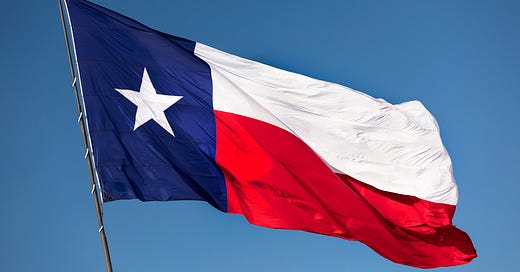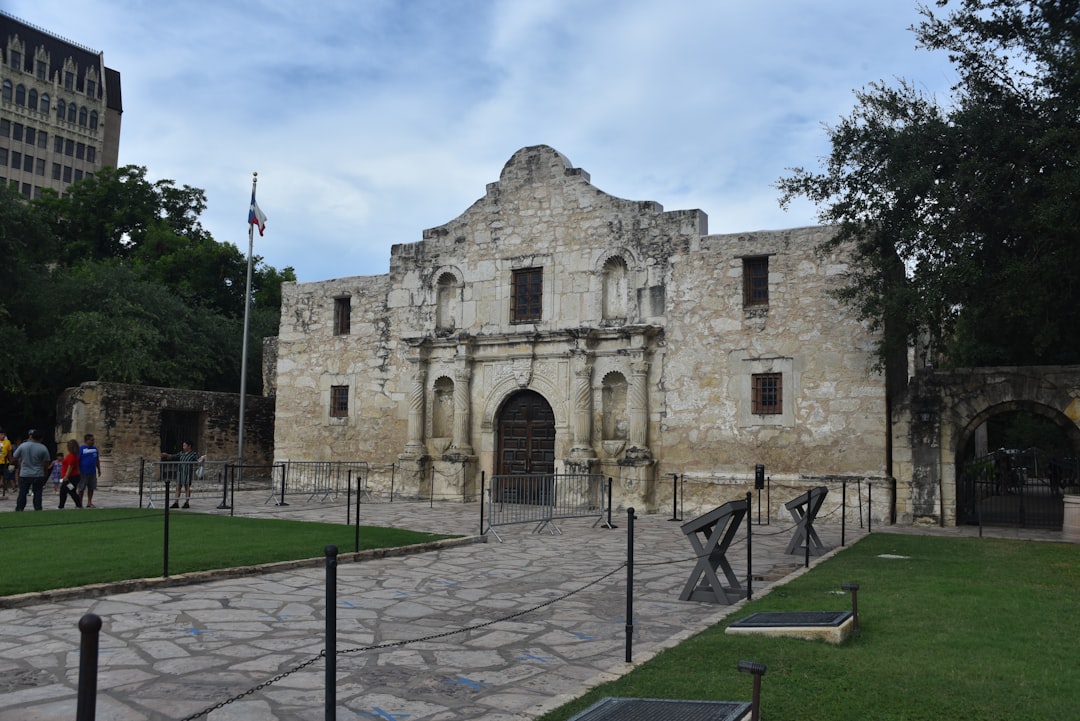I Pledge Allegiance to...Texas?
Texans take love for their state to a whole new level
I thought I was completely prepared for the first day of school. I was entering my fourteenth year in education. I was comfortable with the material I was teaching and I was feeling rejuvenated in our move away from a city where I never felt like I belonged. First period had gone well and I was feeling pretty positive about the semester.
Then the second-period announcements began, and with them, the pledges.
I already had a shaky relationship with the pledge to the American flag. My feelings about the Christian flag were even rockier. But then the student leading the pledges started the pledge to the Texas flag.
Honor the Texas flag; I pledge allegiance to thee, Texas, one state under God, one and indivisible.
I’m sorry, what?
I had spent my entire life proudly proclaiming that I was a California native who grew up in Detroit and was a Michigan girl, through and through. Even thirteen years living in Indiana couldn’t turn me into a Hoosier. I had my state loyalties and I held them tightly to my chest.
But I had never, never, said a pledge to a state flag. To be honest, I didn’t even know that I would be able to quickly identify the state flags of most of the six other states I had lived in.1
This was my introduction to Texas state pride.
Two years after moving back to Indiana, I laughed aloud when I read Beth Moore’s description of her husband Keith’s pedigree in her memoir, All My Knotted Up Life.
His bloodline reaches back to the hallowed days when Texas was a Republic. Anyone who finds little meaning in this was brought into this world, as I was, in one of the lesser forty-nine. Real Texans are born here. Real Texans stay here—or if some cruel twist of fate downgrades them elsewhere, they are compelled by some immutable pledge sewn deep in their lone-starred hearts to testify to their Texasness in under ninety seconds per encounter.2
I should have known that this is what we would learn about Texans in the six years that we lived there. And the pledge was just the tip of the iceberg.
The pledge itself was initially established in 1933. But it wasn’t until 2003 that it became state law for school children to recite it, although the law does allow students to “opt-out with written permission from their parents.” Apparently, Texas is one of at least 12 states that have pledges, although I lived in Michigan for nearly half of my school career and I don’t ever remember hearing the pledge that is supposedly on the books.
We’ve been back in Indiana for two and a half years, with two kids who still have a deep love for Texas and will always have part of it in their soul. After all, our daughter still has two Texas keychains attached to her backpack. But after over two years of not saying a state pledge, I had to ask them about their Texas pledge days.
I asked both of them how much they remember of the Texas state pledge and my daughter said “The first part”; my son said, “None of it. It wasn’t important to me.” Then I asked them what they thought of the Texas pledge after two and a half years living back in Indiana. Our daughter said, “It’s stupid.” Our son said, “It’s goofy.”
And yeah, I have to agree with both of them. I found my son’s comment about it not being important to him to be even more interesting than his declaration that it’s goofy. After all, this is a kid who begged to go back to Houston last year for spring break so that he could see his friends. He still frequently talks about his love for many things Texas, including the Houston Astros. There are memories that he holds very dear.
But the state flag? Nope. It was never an object of great importance to him and he thinks it’s goofy to pledge allegiance to a state.
And I realize that in many ways, we are still outsiders making observations on a relatively new state practice that we never embraced because we found it more than a little weird. (I don’t think I ever regularly said it, and I eventually gave up saying it at all, silently standing at attention when I had the misfortune to be teaching during the announcement period.) And I don’t think that it’s a coincidence that saying the pledge in Texas schools became a state law after the GOP began its takeover of all three branches of the Texas state government.3
But more than anything, the presence of the Texas state pledge just helps to highlight to Texas pride that Beth Moore talked about in her reflections on her husband. Texans are proud to be Texans. They really do believe in the superiority of their state. They believe that there is nothing truer than the saying
I wasn’t born in Texas, but got here as fast as I could.4
There were times that we felt that as well. As Midwestern transplants surrounded by other transplants, we embraced our new home state and many of the things we learned to love about it. We enjoyed the winter months and summers in our pool. We fell in love with the state parks and the diverse ecosystems across the state. We marveled at the complex history and found ways to learn everything we could as we traveled across the state.
And yet we never fully embraced a Panglosian view of Texas as the “best of all possible worlds.” However, that always seemed to be the way many of our friends and neighbors viewed their homeland.
In Travels With Charley: In Search of America, John Steinbeck wrote
I have said that Texas is a state of mind, but I think it is more than that. It is a mystique closely approximating a religion. And this is true to the extent that people either passionately love Texas or passionately hate it and, as in other religions, few people dare to inspect it for fear of losing their bearings in mystery or paradox.5
Perhaps that is what the Texas state pledge represented to me the longer that we lived in Texas. There is something about the state pride that borders on religion. It is a belief that Texas can do no wrong, which makes criticism of its checkered past so much more difficult. It is a blind love filled with myopic pride. Some of that love and pride is well placed. At other times, it ignores the pain inflicted on the state’s most vulnerable citizens. It denies the lessons that might be learned by listening to the experiences of other states. It causes the state to see itself as separate from the rest of the Union it claims to belong to, often to its own detriment.6
But understanding that state pride is the first step that outsiders must take if they want to relate to their Lone Star friends and family. It isn’t a roadblock but a hurdle to better communication. Because what happens in Texas does matter to the rest of us, and denying that hurts everyone.
Support my writing
While most of my work here is free for all subscribers, it is still a labor of love that I fit into the few hours I have when I am not teaching or being an attentive wife and mom. If you would like to support my writing but do not want to commit to being a paid subscriber, please consider a one-time donation.
You can also support me by ordering my book or books from my favorite book lists at my Bookshop.org affiliate page.
If you want to be a regular supporter, you can upgrade your subscription from free to paid and get occasional content only for paid subscribers.
And thank you for supporting my journey 💗
Ok, that might be a slight exaggeration. The Wyoming and California flags are pretty easy to pull out of a flag lineup.
Moore, Beth. All My Knotted-Up Life: A Memoir. Tyndale House Publishers, 2023, p 124
Another post for another day.
You can find this on bumper stickers and t-shirts all over the state.
This quote and a host of other quotes can be found at this website: https://www.texasstandard.org/stories/you-may-all-go-to-hell-and-9-more-great-texas-quotes/
Take, for example, the insistence on being on its own grid, a situation that led to disaster in February 2021.







Thank you for sharing this piece! We lived in Texas for 6 years and my two kids were born there, but we left before they started school so we never experienced the flag allegiance part.
One thing that really surprised me after having lived in Texas for awhile was discovering that the state motto is "friendship".
After doing more research it makes sense, but when you hear so many other things about Texas, like "don't mess with Texas" and "everything is bigger in Texas" and then you hear "friendship", it feels a little off, you know?
I lived in North Carolina for a few years when I was a kid, and we pledged allegiance to the USA flag every morning!
This seems like a totally crazy notion when I tell any Brits about it back in the UK, we barely acknowledge our flag. 😂😂